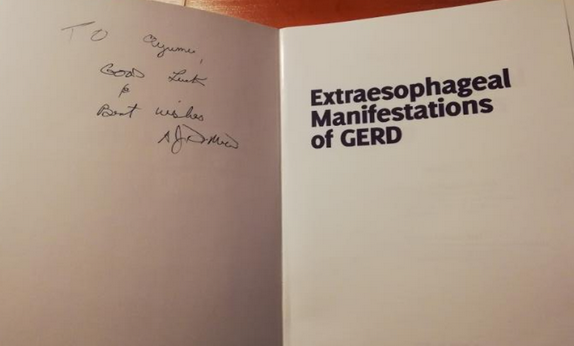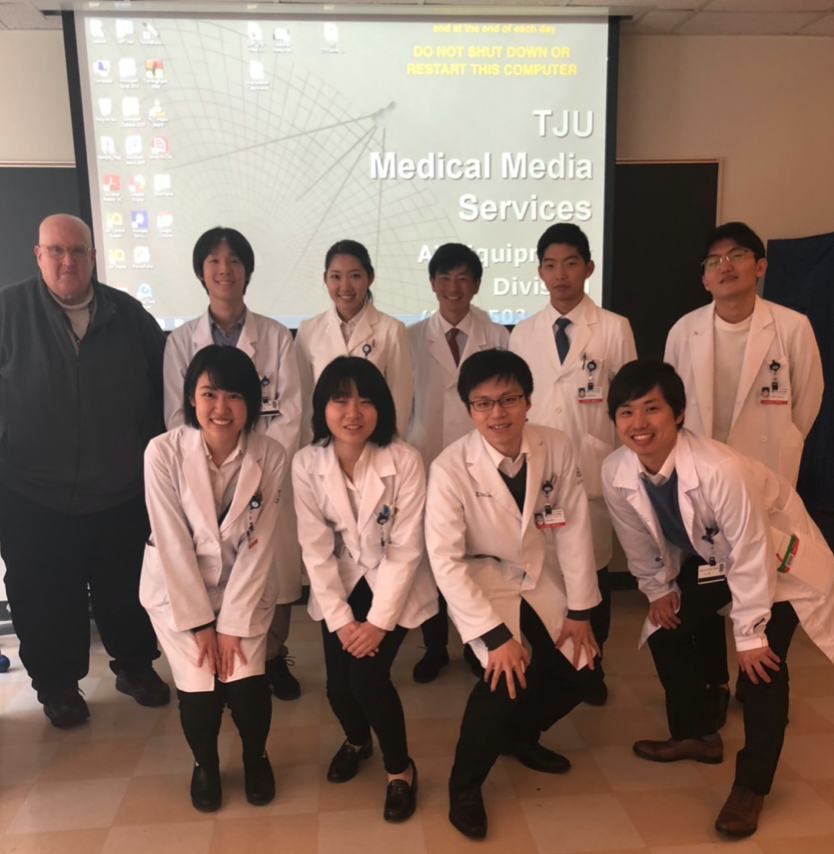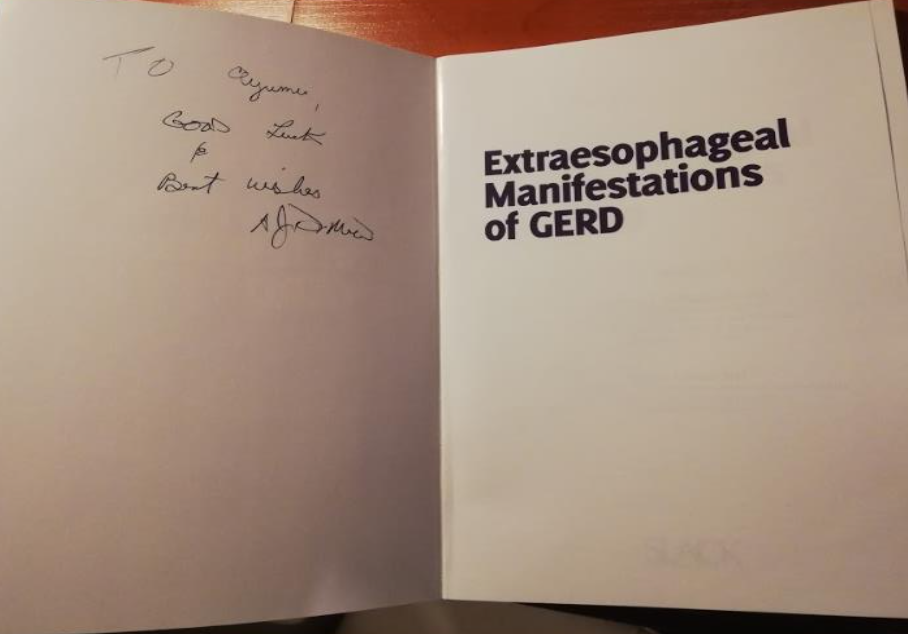Clinical skills program 報告書

この度私はトーマスジェファソン大学病院で実施された Clinical skills program に参加する機会を頂い た。私がこのプログラムに参加した主な理由は先進国の医療を体験すること、そして自分の医学知識 がどの程度通用するのかを知るためである。私はハンガリーの医学部に通っており、これまでは将来 私が働きたいと考えているアフリカや東南アジアの国での研修しか参加したことがなかった。今回の 研修は日本と比較するというよりは主に途上国との比較という面で参加した次第である。また、英語 で医学を履修していることから今まで勉強したことがどれほど通用するかを測る良い機会だと思い参 加した。このレポートでは上記の参加理由と実際に体験したことを比較しながら学んだことを記述す る。
今回の研修での気づきは 1.患者とのコミュニケーション 2.電子カルテ 3.ジェフホープという 3 点ある。実習前からアメリカ人医師のコミュニケーション能力が非常に高いという事を以前の参加者 などから何度も耳にしたが、実際に現場を見ることで確信に変わった。家庭医の外来では笑顔が医師 と患者の両者に見られ、喫煙者には「禁煙があなたの健康にとって一番重要なこと。あなたならでき ると信じている。」というように親身な対応を垣間見ることが出来た。ではなぜアメリカの医師のコ ミュニケーション能力が高いと言われているのかを Mr. Mike と話しているとその背景には保険会社か らの目に見えない圧力と訴訟問題があると指摘を受けた。文化的背景の違いももちろん大きな要因の 一つだと考える。しかし、アメリカの医師免許は保険会社評価によっては取り消しされるという実態 や万が一事件が起きた場合は患者と同じ部屋にいる全員が訴訟を受けるなどといった他国との社会的 背景の違いもある。高いコミュニケーション能力により患者にとってベストな医療を提供すると同時 に満足度を上げることが求められていると考える。
次にカルテはトーマスジェファソン大学の病院では Epic という電子カルテを使用していた。こちら のカルテに外来患者の主訴をメモするが、医師は患者とのコミュニケーションを非常に大事にしてい るため基本は患者の顔を見ながら話を聞き、次の質問をしながらすぐさまメモを取る姿勢をみて情報 処理能力が高いと感じた。そのカルテには過去の病歴、バイタル等のすべての情報が記載されている ため別の医師が見る際も確認しやすく、ナースやレジデントからのメッセージも閲覧できる機能があ るため引き継ぎや新しい患者の情報の共有が効率的に行われていると考える。途上国での研修の際は 3 次医療機関にも関わらずいまだに紙カルテを使用しており、カルテを探す手間や、手書きですべてを 記入するという時間的ロスと不明瞭な文字などで起こるミスコミュニケーションというデメリットが 見られる。また、災害等ですべての資料が紛失するというケースもある途上国でのカルテの電子化は 必要不可欠なものだと感じた。
最後に、ジェフホープという組織はホームレスの方など社会的に恵まれない人向けの医療シェルタ ーで主に学生が中心となって活動している。そこでは医療行為だけではなく、保険加入の手助けや生 活習慣レベルでの教育、啓もう活動等が実施されている。特に興味深かった点は外来患者を診察しマ ネジメントまで一通り自分たちで考えるという事だ。その後レジデントの先生に患者の様態をプレゼ ンし意見を被る。そしてレジデントが実際に患者を診てその後のケアの方針を決定するというように M1 の学生は上級生から学び、上級生はレジデントから学ぶという流れが出来ており学生のうちからま るで医師のように働く意識が芽生えている。最初の印象は患者が学生の練習台に使われているという
2019年4月13日
見方も可能ではないかと示唆していたが、患者自身も現実的なサポートを受けることができ何より日 常生活において必要不可欠な人とコミュニケーションを取ることで日ごとの悩みや苦労を打ち明ける 場でもあると実感した。つまり相互に得をしているシステムだと考える。もちろんこのような組織が すべての大学に置かれることが理想なのかもしれないが大学からの金銭的免除や政府の理解があって こその組織だと考えるのでこういった面ではアメリカは恵まれない人たちへのサポートが充実してい ると言えるだろう。実際にアメリカの学生がいかに積極的に医療行為に参加しているかを見て、私は 少しでも彼らに近づけるよう努力することを決意した。
謝辞
今回の研修の選考から準備までお世話になった野口医学研究所の皆様、現地で歓迎会を開催してい ただいた佐藤隆美先生、学生のサポートをしていただいた Dr. Charles Poh, Ms. Janice Bogen, Mr. Mike Kenney, ラディ由美子さん、中村理映子さん、Bowen Yao さん、Noah Levy さん、指導に携わっていただ いた Dr. Christine M. Jerpbak, Dr. Gillian Love, Dr.Anthony J. DiMarino, Dr.Joseph F. Majdan, Dr.Tara Berman Dr. Christopher Henry, 他多数の皆様方に心から感謝申し上げます。
Report about clinical skills program
I’m very glad to have had a great opportunity to attend the clinical skills program at Thomas Jefferson University hospital. Some reasons why I participated in this program are to experience how physicians work in developed country, and to see how much my medical knowledge is applicable in clinical practice. I’m studying medicine in Hungary, and I have only been to African and South East Asian countries for a medical practice, where I would like to work in the future. I thought this would be a great opportunity to compare these countries with America through this program. In this report, I would like to summarize what I have learned in the program.
I have realized three points in terms of the way they work in America. 1. Communication skills. 2. Electronic medical records, 3. Jeff Hope. Before I went to America, the former participants told me about how high the communication skill of physicians in America are. I noticed this fact is surely true. In the outpatient of family medicine, I could see lots of smiles in both patients and physicians during the conversation. The most memorable moment was when the physician tried to convince a patient to quit smoking. She was speaking in a way that she really cared about her patient. “I understand it’s very tough for you to stop smoking, but this is the best thing for your health. I know you can do it. I’m always with you”. Then, I thought why it is said that the communication skill are quite high. I was talking to Mr. Mike, and he mentioned that there is a huge pressure from the insurance company and the lawsuit issue. The cultural background is definitely one of the factors as well. However, there is a difference in a social background. The medical licence in America should be updated and checked by the insurance company, which is different from Japan. Also, all of the members in the room where the medical procedure has been done can be sued by the patient if something wrong happens. Therefore, it is necessary to have a good communication skill in order to provide the patient with the best service, and fulfil their expectations.
As for an electrical medical report, there is a software called Epic that is used in this hospital. On this record, the physician writes every single detail about the patient by taking the history. I believe that they have a great capacity of information processing, because they never forget eye contact with the patient while taking some notes. I also noticed that everything is recorded on this record, such as past medical history, the hospital they were at previously and messages from residents or nurses, so it is very useful and efficient to share information with all members who are involved in a particular patient. In a tertiary hospital in developing countries where I have been to, they still use paper-based medical record. It’s a waste of time to look for them and to write everything by hand, because sometimes these records are not organized. Also, there is a misunderstanding due to unclear handwriting. These paper-based records can be lost by natural disaster, so I really hope the electric medical record will be applied in these countries soon as well.
There is an organization called Jeff Hope that is providing homeless people with the basic health care, such as giving medications, taking history, doing physical examination, educating them to prevent lifestyle diseases, helping to purchase medical insurance and so on. The most interesting part was that not only M3 and M4 student, but even M1 students were also there for outpatients and decide the diagnosis. Afterwards, they would ask for some advice from residents. This means that they will learn the clinical skills while they are still studying basic medicine. Although, I also had a different perspective towards Jeff Hope, seeing homeless patients seen by M1 students means that they are used to practice for students, they actually needed help and even talking about daily life is also a huge help for them. Therefore, this system is working well for each other. It is ideal that all universities have such system, but the financial support and understanding by the government is difficult to sustain it. Also, by facing how medical students in America contributed their hard work into the society, I have strongly decided to learn as much as possible during clinical practice from now on.
Acknowledgment:
I would like to express my special thanks and gratitude to all of the members at Noguchi Medical Research Institute, Dr. Takami Sato, Dr. Charles Poh, Ms. Janice Bogen, Mr. Mike Kenney, Ms. Yumiko Radi, Ms. Rieko Nakamura, Mr. Bowen Yao, Mr. Noah Levy, Dr. Christine M. Jerpbak, Dr. Gillian Love, Dr. Anthony J. DiMarino, Dr. Joseph F. Majdan, Dr. Tara Berman, Dr. Christopher Henry and everyone else who supported me to make this program happen. Thank you very much.
April 13th 2019
Submitted by Ayumu Kawamoto University of Szeged, Hungary

 先生からの贈呈品/ A book given by Dr. DiMarino
先生からの贈呈品/ A book given by Dr. DiMarino
